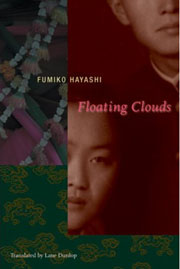 Fumiko Hayashi
Fumiko Hayashi
Translated by Lane Dunlop
Columbia University Press ($27.50)
by Scott Bryan Wilson
In November 2005, I saw all thirty-one films in a Mikio Naruse retrospective—among them his 1955 film Floating Clouds, one of many adaptations he did of Fumiko Hayashi's novels. Until recently, very much like Naruse's films, Hayashi's work was impossible to find in an English translation. Luckily, Columbia University Press has published this late novel, a bleak romance which examines the lives of lonely Japanese in the wake of the atomic bomb.
Floating Clouds is the story of two on-and-off lovers who meet in French Indochina near the end of World War II. A forestry official named Tomioka, a married man who regularly cheats on his wife, is pursued by Yukiko, a secretary in his office who fled Japan to escape the daily rapes by her landlord. From Vietnam to Tokyo to tiny towns to a small nearly uninhabited island, the novel follows their intermittent meetings through the years, first as refugees, then as repatriates, and finally as Japanese who can't feel at home even in their own country.
This is not, however, a typical romance story, for it is driven by despair. (Even Naruse, who's often accused of a nihilistic outlook, struggles to encompass Floating Clouds' huge range of misery in the film version.) As Tomioka takes on new lovers and eludes Yukiko, Yukiko lives in a shack, always holding out hope that one day she and Tomioka will be together. In many ways, they're perfect for each other: Yukiko is clingy, lonely, needy, poor, and desperate, while Tomioka is selfish, cold, needy, poor, and thoughtless. They never really seem happy when they're together, but when they're apart they're just as unhappy: forced to eke out existence in poverty and squalid conditions, their lives are filled with alcoholism, cruelty, sickness, murder, death, depression, violence, endless talk of suicide, and foul weather.
Tomioka, whose "selfish heart . . . heaped new sins upon the old" looks for happiness in every woman he meets who isn't his wife or Yukiko: a Vietnamese maid whom he impregnates, a juvenile delinquent, a barmaid named Seiko whom he seduces when Yukiko isn't looking. He fantasizes about others. Yukiko, somewhat more faithful to Tomioka, starts working for the religion her rapist ex-landlord co-founds, The Great Sunshine Religion, which exists to fleece believers out of their money.
This is a world in which characters survive by selling possessions, turning to illegal activities, and doing without. Dreams of long-term plans bearing fruit are crushed by the realities of postwar Japan. Throughout all of this Yukiko and Tomioka do their dance, continually breaking up yet always staying together. Tomioka, staring out at the miserable weather with Yukiko crying beside him, wonders "How long would this woman torment him, like a moneylender harassing a debtor, with the memories of the past?" Neither can find their own way in life after returning to Japan, unable to break free of the endless cycle of poverty and alcoholism.
In short chapters, Hayashi masterfully switches point of view between Yukiko and Tomioka, and writes with a restraint which doesn't sensationalize or sentimentalize her novel's brutality. The novel doesn't relish its own gloom. The repetition and plotlessness only underscore the always-uncertain future of its protagonists. It's a remarkable book, and hopefully it will herald more translations of Hayashi's work.
Click here to purchase this book at your local independent bookstore

Rain Taxi Online Edition, Winter 2006-2007 | © Rain Taxi, Inc. 2006-2007
